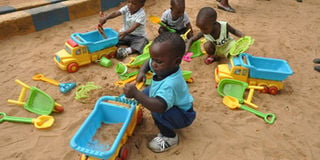Rural areas embracing pre-school movement

Following a goverment move to have all government-aided primary schools start a nursery section, rural children are benefitting from the surge of pre-schools. FILE PHOTO
What you need to know:
- Only about three years ago pre-schools were common in urban centres. Following a government move to start a nursery school on all universal primary education schools, there is a surge in these early childhood development centres across the country’s rural areas. But this is not without challenges.
Nursery schools, previously limited to urban areas in the country, and run mostly by private entities, have in the last three years started sprouting in rural areas.
The schools are offering three to five-year-olds from humble rural families opportunity to reap from the benefits of early childhood learning.
The new trend follows a recent move by government-aided schools throughout the country to start community nursery schools also known as Early Childhood Development (ECD) centres or pre-primary schools.
In Kamuli District for example, 107 community-run nursery schools have been started at government-aided primary schools. The nursery schools have added to the 296 private ones and six home-based early learning centres in the district, Tom Badaza, the inspector of schools in charge ECD Centres revealed recently.
In neighbouring Buyende District, the education officer, Dison Bwire, says out of the 91 nursery schools, 26 are attached to UPE schools while the rest are privately-owned.
The story is almost similar in other districts around the country. Nursery schools attached to UPE schools in majority of districts have increased pre-primary enrolment in the country.
Unlike the private ones located mostly in urban areas, the ones attached to government-aided UPE schools are giving rural children a rare opportunity to access early learning and try to close the gap with their urban counterparts.
The right foundation
According to the Uganda Demographic and Health Survey (UDHS) 2016, only 37 per cent of children aged three to five years were attending an organised early education programme.
The gap is partly attributed to lack of pre-primary schools or centres in the country, especially in the rural areas.
Research has shown that children who attend pre-primary school tend to learn and perform better when they join primary school.
It is in those early years of life when the foundation for social, emotional, verbal and intellectual skills is built. They also tend to like school and are less likely to drop out on their own.
As the numbers surge at the community nursery schools attached to UPE schools, the latter are struggling to cope partly due to inadequate tuition collections from the parents.
The hurdles
Bwire explains that nursery schools are expensive to run, need more trained children handlers and government is yet to include nursery teachers/caregivers on the government payroll, which leaves the burden on the schools.
In addition to paying tuition, parents also pay for their meals or provide foodstuffs such as maize for porridge. But many parents struggle to comply on both requirements prompting calls on government to make nursery education free at government-aided schools.
Kwagala, a nursery school teacher at Kyeeya Primary School, says it is easier to teach primary school pupils than nursery ones because the latter require a lot of learning activities, varied learning materials and patience yet more attention is paid to upper primary teachers.
“The parents are reluctant to provide meals yet these children need to eat, besides play materials are also a problem yet the pay is meagre. It takes one with a passion for children to bear all this,” she said.
There is hope though as it has been noted that government is trying to address the shortage of skilled caregivers and learning packages in nursery schools in the country.
Government intervention
According to Hajjat Safina Mutumba, the senior education officer at the Education Ministry, the ministry has developed policies and guidelines to give direction to pre-primary education right from their establishment and management. It has also started training pre-school teachers through Teacher Training Colleges.
“UNICEF is working closely with the Instructors Education and Training department which is responsible for training teachers to come up with training manuals detailing the numerous areas that enable them understand how children learn, and the pedagogical skills and methodologies,” Mutumba explained.
In addition, she said, “the ministry has developed a Community Mobilisation Manual and Centre Management Committee (CMCs) Training Manual to allow communities own the process of managing pre-primary schools. For functionality, CMC members, too, have to go through some training.
“This is in addition to a learning framework which was developed to guide caregivers/ECD teachers on age-appropriate content to be delivered to the early learners. It also focuses on the holistic development of the learners including; cognitive, affective and the psychomotor domains. It advocates for play-based learning activities, communication skills, socialisation skills, emotional development, spiritual development, and moral aspects, among others,” she added.
Their views
Kamuli Municipal Education Officer Joseph Musoke says both learning, health and nutrition matter a lot in the lives of under five-year-olds.
“A child’s ability to think, form relationships, and live up to their full potential is directly related to the synergistic effect of good health, good nutrition, and appropriate stimulation and interaction with others. A large body of research has proven the importance of early brain development and the need for good health and nutrition.”
Patrick Emukule, the Plan International East Central Programme Area manager, says there is need to work with schools to ensure that the children enrol on time, stay in school and proceed to the next level.
“We need bye-laws to ensure that children go through the ECCD centres before joining Primary One but also the crucial task is to build capacity of teacher,” he added.



